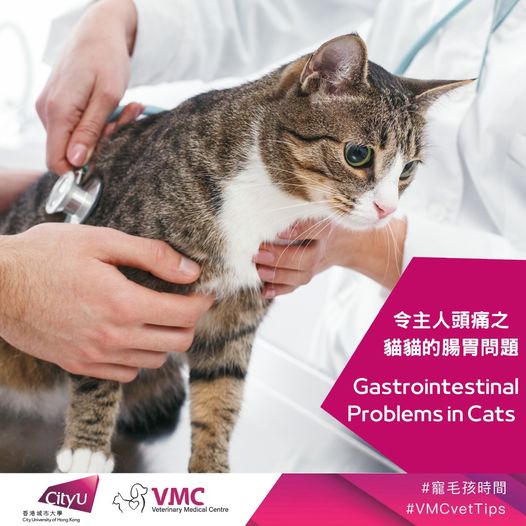
What are gastrointestinal and digestive disorders?
Any disorder that reduces the digestion or absorption of food, or alters its passage through the digestive tract, can be called a digestive disorder. Gastrointestinal disorders in cats are quite common and most clear up within a few days. But some cats need long-term management because they have regular or permanent gastrointestinal. GI disorders can lead, to dehydration, acid-base and electrolyte imbalances, and malnutrition so it is important to recognize the signs and consult with your veterinarian.
The common cause of acute gastrointestinal problems in cats
Dietary indiscretion
– the most common cause of sudden onset, acute tummy trouble, is simply your cat has eaten something he or she shouldn’t have. Maybe she helped herself to the leftovers from last night’s dinner, or decided to nibble on the exotic plant that your friend gave you? Due to the absence of certain chemical pathways cats cannot process many compounds effectively as humans can do. And lots of time, rich food/oily food rarely agree with a cat’s tummy… so vomiting and diarrhea may ensue
Incorrect diet
– while flatulence and bad breath (technically called Halitosis) is more common in our canine rather than feline friends, incorrect diet can lead to a gassy tummy and unpleasant aroma emerging from either end! Often related to cereal and sugars in a diet but with many other causes, flatulence is generally much less common in cats fed fresh meat. While bad breath is often associated with an inappropriate diet, it can also be associated with more serious problems such as kidney disease, or less serious ones such as teething.
Parasites
– Intestinal parasites can cause many issues, including vomiting and diarrhea, and are typically transmitted when your cat eats rodents or other infected prey. Giardia is such a problem that is on the rise where cats pick it up from the feces of other cats when burying theirs in the same litter tray.
Viruses
– many different strains of the virus can cause digestive upset in cats, some of which (such as Feline Enteritis) is highly contagious and can be life-threatening.
Bacteria
– can be ingested through contaminated food or water, transmitted from other animals, or may even be passed on from animal to human.
Pancreatitis
– inflammation of the pancreas can disrupt the flow of enzymes into the digestive tract, forcing the enzymes out of the pancreas and into the abdominal area and which will, in effect, cause the body to begin digesting itself. Pancreatitis can be caused by an inflamed digestive gland, by medications, or consuming something that’s difficult for the pancreas to handle, such as a meal high in fat or even high sugar stresses in the liver.
Hair Balls (Furballs)
– all cats occasionally suffer from hairballs. They occur as a result of your cat grooming his or herself and, in the process, swallowing hair. Normally, the cat’s digestive system is able to handle the hair and it simply passes through the intestinal tract and out in the feces, but sometimes a little extra help is needed.
Common causes of chronic gastrointestinal problems in cats
Food allergies
– Food allergies are now very common in cats as there are so many additions now to modern diets. If you think your cat is affected, try going back to a simple, natural meat diet and sticking to one protein source (such as chicken or fish) until you see an improvement. Food allergies are a particularly common cause of regurgitation, where your cat may throw up 20 minutes or even immediately after eating, or a cause of your cats putting off eating for as long as possible as they know the food is going to make them nauseous.
Inflammatory bowel disease (IBD)
– a condition where the cat’s gastrointestinal tract has been chronically inflamed or irritated.
While current studies suggest the cause could be due to abnormal interaction between diet, immune system, bacteria population in the gut, and other environmental factors, often the exact cause of IBD is unknown and could be challenging to diagnose.
Worms
- can be a cause of both chronic and acute digestive problems and can cause a range of digestive problems, including vomiting and diarrhea.
The importance of nutrition
Your cat's food can have a significant impact on her GI tract health. A number of different nutritional approaches could be recommended for your cat depending on the specific diagnosis and the symptoms. The main goal is to alleviate your cat’s signs/symptoms of vomiting and/or diarrhea. Veterinarians recommend feeding cats with this condition a food that is highly digestible to help to prevent irritation to their sensitive stomach and intestines. Also, high-soluble and insoluble fiber foods combined with moderate fat levels help support proper intestinal function. It is also important to monitor your cat’s hydration during the recovery phase to help ensure she has enough water and corrects any fluid deficiencies.
Because several of these gastrointestinal conditions may be ongoing, long-term nutritional management of the disorder may be required. For accurate diagnosis and treatment options, always consult your veterinarian and ask them to recommend the best food for your cat’s digestive health.
Appointment/Enquiry:
3650 3000 (Mon-Sun: 9:00am – 7:00pm)
Address:
G-2/F, Trinity Towers, 339 Lai Chi Kok Road, Sham Shui Po
Online booking for revisit with primary care veterinarians or vaccination:
https://www.cityuvmc.com.hk/en/online-booking